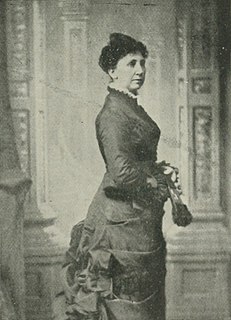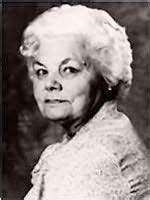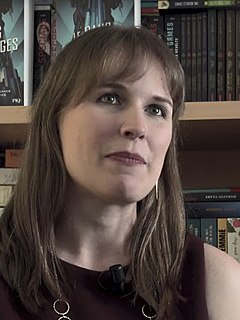A Quote by Humphry Davy
I suppose there was never yet a woman who had not somewhere set up on a pedestal in her brain an ideal of manhood. ... He never is finished till the brain of his creator ceases to work, till she has added her last touch to him, and has laid down the burden of life and gone elsewhere, perhaps to some happy land where ideals are more frequently realised than ever happens here.
Related Quotes
But the actual touch of her lingered, inside his heart. That remained. In all the years of his life ahead, the long years without her, with never seeing her or hearing from her or knowing anything about her, if she was alive or happy or dead or what, that touch stayed locked within him, sealed in himself, and never went away. That one touch of her hand.
There was a warmth of fury in his last phrases. He meant she loved him more than he her. Perhaps he could not love her. Perhaps she had not in herself that which he wanted. It was the deepest motive of her soul, this self-mistrust. It was so deep she dared neither realise nor acknowledge. Perhaps she was deficient. Like an infinitely subtle shame, it kept her always back. If it were so, she would do without him. She would never let herself want him. She would merely see.
She wondered whether there would ever come an hour in her life when she didn't think of him -- didn't speak to him in her head, didn't relive every moment they'd been together, didn't long for his voice and his hands and his love. She had never dreamed of what it would feel like to love someone so much; of all the things that had astonished her in her adventures, that was what astonished her the most. She thought the tenderness it left in her heart was like a bruise that would never go away, but she would cherish it forever.
She saw him the first day on board, and then her heart sank into her shoes as she realized at last how much she wanted him. No matter what his past was, no matter what he had done. Which was not to say that she would ever let him know, but only that he moved her chemically more than anyone she had ever met, that all other men seemed pale beside him.
She wasn't looking her best; her hair was coming down, for she had shed hairpins as she'd run, and her face lacked powder and lipstick. She looked hot and tired and surprisingly happy. He thought that he had never seen anyone quite as beautiful, so absolutely necessary to his happiness. It wasn't the first time he had fallen in love, but he knew that this was the last.
I never did, nor do I believe I ever shall, give advice to a woman who is setting out on a matrimonial voyage; first, because I never could advise one to marry without her own consent; and, secondly, I know it is to no purpose to advise her to refrain when she has obtained it. A woman very rarely asks an opinion or requires advice on such an occasion, till her resolution is formed; and then it is with the hope and expectation of obtaining a sanction, not that she means to be governed by your disapprobation, that she applies.
Was it all in my head? A Lunar trick?” Her stomach twisted. “No.” She shook her head, fervently. How to explain that she hadn’t had the gift before? That she couldn’t have used it against him? “I would never lie—” The words faded. She had lied. Everything he knew about her had been a lie. “I’m so sorry,” she finished, the words falling lamely in the open air. Kai peeled his eyes away, finding some place of resignation off in the glistening garden. “You’re even more painful to look at than she is.
Some attribute had departed from her, the permanence of which had been essential to keep her a woman. Such is frequently the fate, and such the stern development, of the feminine character and person, when the woman has encountered, and lived through, an experience of peculiar severity. If she be all tenderness, she will die. If she survive, the tenderness will either be crushed out of her, or—and the outward semblance is the same—crushed so deeply into her heart that it can never show itself more.
I'd lay down my life for her - Mas'r Davy - Oh! most content and cheerful! She's more to me - gent'lmen - than - she's all to me that ever I can want, and more than ever I - than ever I could say. I - I love her true. There ain't a gent'lman in all the land - nor yet sailing upon all the sea - that can love his lady more than I love her.
And there you see the distinction between our feelings: had he been in my place, and I in his, though I hated him with a hatred that turned my life to gall, I never would have raised a hand against him. You may look incredulous, if you please! I never would have banished him from her society as long as she desired his. The moment her regard ceased, I would have torn his heart out and drank his blood! But, till then - if you don't believe me, you don't know me - til then, I would have died by inches before I touched a single hair on his head!
I. At Tea THE kettle descants in a cosy drone, And the young wife looks in her husband's face, And then in her guest's, and shows in her own Her sense that she fills an envied place; And the visiting lady is all abloom, And says there was never so sweet a room. And the happy young housewife does not know That the woman beside her was his first choice, Till the fates ordained it could not be so.... Betraying nothing in look or voice The guest sits smiling and sips her tea, And he throws her a stray glance yearningly.
He lifted his gaze to the framed photograph of Tanya and him taken on their wedding day. God, she had been lovely. Her smile had come through her eyes straight from her heart. He had known unequivocally that she loved him. He believed to this day that she had died knowing that he loved her. How could she not know? He had dedicated his life to never letting her doubt it.
There is simply no dignified way for a woman to live alone. Oh, she can get along financially perhaps (though not nearly as well as a man), but emotionally she is never left in peace. Her friends, her family, her fellow workers never let her forget that her husbandlessness, her childlessness - her selfishness, in short - is a reproach to the American way of life.
After she was gone there would be no one who knew the whole of her life. She did not even know the whole of it! Perhaps she should have written some of it down...but really what would have been the point in that? Everything passed, she would too. This perspective offered her an unexpected clarity she nearly enjoyed, but even with this new clarity the world offered no more explanation for itself than it ever had.





































